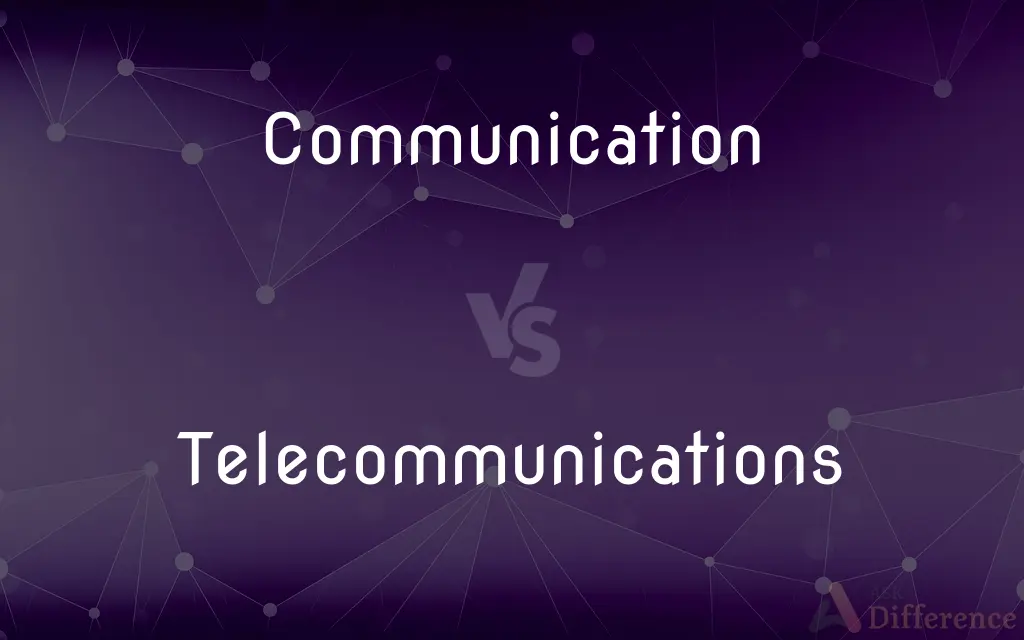Communication vs. Telecommunications — What's the Difference?
By Tayyaba Rehman & Urooj Arif — Updated on March 16, 2024
Communication is the process of exchanging information, while telecommunications specifically refer to electronic systems for long-distance communication.

Difference Between Communication and Telecommunications
Table of Contents
ADVERTISEMENT
Key Differences
Communication encompasses a broad spectrum of methods through which information is conveyed between senders and receivers. This includes verbal exchanges, written messages, non-verbal cues like body language, and even artistic forms of expression. It's fundamental to human interaction, enabling individuals and groups to share ideas, feelings, and information. On the other hand, telecommunications involve the transmission of signals over a distance for the purpose of communication, often using modern electronic systems. This includes telephony, radio, television, and internet-based communications. Telecommunications enable real-time or near-real-time exchange of information over vast distances, a cornerstone of global connectivity.
While communication can be as simple as a face-to-face conversation or a handwritten note, telecommunications require the use of technical devices and networks. Telecommunications also encompass the infrastructure and technologies that facilitate electronic communication, such as fiber optics, satellites, and wireless networks. This infrastructure is crucial for the functioning of global economies, governments, and societies, enabling rapid and efficient exchange of information.
Communication is inherent to all social beings and can occur in various contexts and forms, not necessarily requiring technology. From a personal discussion to gestures and expressions, communication is versatile and ubiquitous in daily life. Telecommunications, while a subset of communication, is specifically characterized by its reliance on technology to overcome geographical barriers. It has revolutionized how people connect, work, and access information, making it possible to communicate across continents in real-time.
The principles of effective communication, such as clarity, coherence, and attentiveness, are applicable to both interpersonal communication and telecommunications. However, telecommunications also involves considerations like signal integrity, bandwidth, and connectivity to ensure that the electronic transmission of information is reliable and efficient.
In the realm of telecommunications, technical standards, protocols, and security measures are critical for facilitating seamless and secure communication across diverse devices and networks. These technical aspects are essential for maintaining the integrity and privacy of electronic communications.
ADVERTISEMENT
Comparison Chart
Definition
Exchange of information between parties
Electronic transmission of information over distance
Mediums
Verbal, non-verbal, written, visual
Telephone, radio, television, internet
Dependency on Technology
Not necessarily reliant on technology
Heavily reliant on technology and networks
Scope
Can be personal, direct, and non-technical
Often involves complex systems and infrastructure
Geographical Limitation
Limited by proximity without technology
Overcomes geographical barriers with technology
Compare with Definitions
Communication
Communication is the act of exchanging information through various means.
A conversation between friends is a form of personal communication.
Telecommunications
Telecommunications involve the transmission of information over distances using electronic means.
Making a phone call to someone in another city is a form of telecommunications.
Communication
It can occur in a variety of contexts, from personal to mass communication.
Mass communication includes broadcasting news to the public through television.
Telecommunications
Telecommunications infrastructure includes satellites, fiber optics, and wireless transmitters.
Global internet connectivity is made possible through a network of undersea fiber optic cables.
Communication
Effective communication involves clarity, empathy, and active listening.
Active listening in a discussion ensures understanding and effective exchange of ideas.
Telecommunications
It relies on technical devices and networks, such as the internet and cellular networks.
Internet-based services like email and instant messaging are telecommunications tools.
Communication
Communication is essential for social interaction and relationship building.
Team meetings at work involve communication to align on goals and tasks.
Telecommunications
It has revolutionized global communication, enabling instant connectivity across the world.
Video conferencing allows for real-time meetings between participants from different continents.
Communication
It can be verbal, non-verbal, written, or visual.
Non-verbal communication includes gestures and facial expressions.
Telecommunications
Technical standards and protocols are crucial for interoperability and security in telecommunications.
The TCP/IP protocol suite is foundational for data transmission over the internet.
Communication
Communication (from Latin communicare, meaning "to share"or "to be in relation with") is "an apparent answer to the painful divisions between self and other, private and public, and inner thought and outer word." As this definition indicates, communication is difficult to define in a consistent manner, because it is commonly used to refer to a wide range of different behaviors (broadly: "the transfer of information"), or to limit what can be included in the category of communication (for example, requiring a "conscious intent" to persuade). John Peters argues the difficulty of defining communication emerges from the fact that communication is both a universal phenomena (because everyone communicates), and a specific discipline of institutional academic study.One possible definition of communication is the act of developing meaning among entities or groups through the use of sufficiently mutually understood signs, symbols, and semiotic conventions.
Telecommunications
Telecommunication is the transmission of information by various types of technologies over wire, radio, optical, or other electromagnetic systems. It has its origin in the desire of humans for communication over a distance greater than that feasible with the human voice, but with a similar scale of expediency; thus, slow systems (such as postal mail) are excluded from the field.
Communication
The act of communicating; transmission.
Telecommunications
Often telecommunications(used with sing. verb) The science and technology of communication at a distance by transmission of electrical impulses, electromagnetic waves, or optical pulses, as by telephone, radio, television, or computer network
Telecommunications is an important area of professional growth.
Communication
The exchange of thoughts, messages, or information, as by speech, signals, writing, or behavior.
Telecommunications
Often telecommunications(used with a pl. verb) The systems used in transmitting such messages
Telecommunications were disrupted by the brownout.
Communication
Interpersonal rapport.
Telecommunications
A message so transmitted.
Communication
The art and technique of using words effectively to impart information or ideas.
Telecommunications
Plural of telecommunication
Communication
The field of study concerned with the transmission of information by various means, such as print or broadcasting.
Telecommunications
Alternative form of telecommunication
Communication
Any of various professions involved with the transmission of information, such as advertising, broadcasting, or journalism.
Communication
Something communicated; a message.
Communication
A system, such as mail, telephone, or television, for sending and receiving messages.
Communication
A network of routes for sending messages and transporting troops and supplies.
Communication
Communications The technology employed in transmitting messages.
Communication
(Biology) The transfer of information from one molecule, cell, or organism to another, as by chemical or electrical signals or by behaviors.
Communication
An opening or connecting passage between two structures.
Communication
A joining or connecting of solid fibrous structures, such as tendons and nerves.
Communication
The act or fact of communicating anything; transmission.
Communication of smallpox
Communication of a secret
Communication
(uncountable) The concept or state of exchanging data or information between entities.
Some say that communication is a necessary prerequisite for sentience; others say that it is a result thereof.
The node had established communication with the network, but had as yet sent no data.
Communication
A message; the essential data transferred in an act of communication.
Surveillance was accomplished by means of intercepting the spies' communications.
Communication
The body of all data transferred to one or both parties during an act of communication.
The subpoena required that the company document their communication with the plaintiff.
Communication
An instance of information transfer; a conversation or discourse.
The professors' communications consisted of lively discussions via email.
Communication
A passageway or opening between two locations; connection.
A round archway at the far end of the hallway provided communication to the main chamber.
Communication
(anatomy) A connection between two tissues, organs, or cavities.
Communication
(obsolete) Association; company.
Communication
Participation in Holy Communion.
Communication
(rhetoric) A trope by which a speaker assumes that his hearer is a partner in his sentiments, and says "we" instead of "I" or "you".
Communication
The act or fact of communicating; as, communication of smallpox; communication of a secret.
Communication
Intercourse by words, letters, or messages; interchange of thoughts or opinions, by conference or other means; conference; correspondence.
Argument . . . and friendly communication.
Communication
Association; company.
Evil communications corrupt good manners.
Communication
Means of communicating; means of passing from place to place; a connecting passage; connection.
The Euxine Sea is conveniently situated for trade, by the communication it has both with Asia and Europe.
Communication
That which is communicated or imparted; intelligence; news; a verbal or written message.
Communication
Participation in the Lord's supper.
Communication
A trope, by which a speaker assumes that his hearer is a partner in his sentiments, and says we, instead of I or you.
Communication
The activity of communicating; the activity of conveying information;
They could not act without official communication from Moscow
Communication
Something that is communicated by or to or between people or groups
Communication
A connection allowing access between persons or places;
How many lines of communication can there be among four people?
A secret passageway provided communication between the two rooms
Common Curiosities
What is communication?
Communication is the exchange of information, ideas, or feelings between individuals or groups, through various means like speech, writing, or gestures.
What is telecommunications?
Telecommunications is the electronic transmission of information over a distance, involving devices and networks like phones, computers, and the internet.
How do communication and telecommunications differ?
Communication encompasses all forms of information exchange, while telecommunications specifically refers to the electronic transmission of information over distances.
Is telecommunications a type of communication?
Yes, telecommunications is a subset of communication focused on electronic transmission over distances.
How has telecommunications changed communication?
Telecommunications has expanded the possibilities of communication, allowing for instant global interactions that are not limited by geographical distance.
How do non-verbal cues fit into communication?
Non-verbal cues like facial expressions and body language are integral to communication, adding depth and context to verbal exchanges.
Can telecommunications be secure?
Yes, but it requires implementing strict protocols and security measures to protect data during transmission.
Why is communication important?
Communication is vital for understanding, collaboration, and building relationships among individuals or groups.
Can communication occur without technology?
Yes, communication can occur through non-technological means like face-to-face conversations or written letters.
How do cultural differences impact communication?
Cultural differences can significantly affect communication styles, interpretations, and effectiveness, highlighting the need for cultural awareness in both personal and technological interactions.
What are examples of telecommunications?
Examples include phone calls, emails, satellite broadcasts, and internet communications.
What role does technology play in telecommunications?
Technology is essential in telecommunications for transmitting information electronically over distances, requiring devices and infrastructure.
What are examples of communication?
Examples include conversations, gestures, letters, and facial expressions.
Do telecommunications require infrastructure?
Yes, telecommunications depend on infrastructure like cables, towers, and satellites for transmitting signals.
What are the challenges in telecommunications?
Challenges include maintaining infrastructure, ensuring data security, and managing signal interference.
Share Your Discovery

Previous Comparison
Upward vs. Upwards
Next Comparison
Barefooted vs. BarefootAuthor Spotlight
Written by
Tayyaba RehmanTayyaba Rehman is a distinguished writer, currently serving as a primary contributor to askdifference.com. As a researcher in semantics and etymology, Tayyaba's passion for the complexity of languages and their distinctions has found a perfect home on the platform. Tayyaba delves into the intricacies of language, distinguishing between commonly confused words and phrases, thereby providing clarity for readers worldwide.
Co-written by
Urooj ArifUrooj is a skilled content writer at Ask Difference, known for her exceptional ability to simplify complex topics into engaging and informative content. With a passion for research and a flair for clear, concise writing, she consistently delivers articles that resonate with our diverse audience.














































